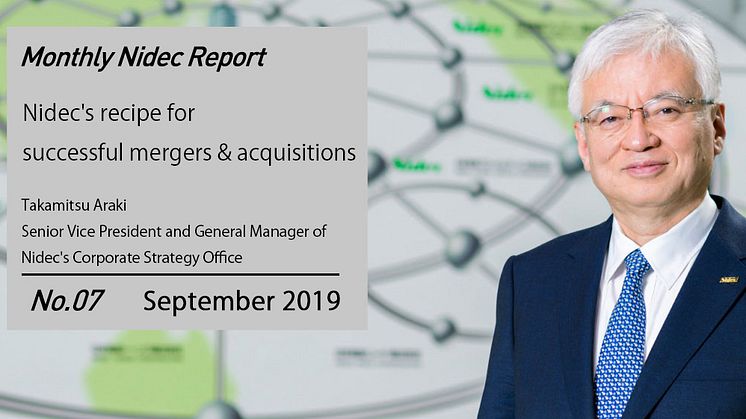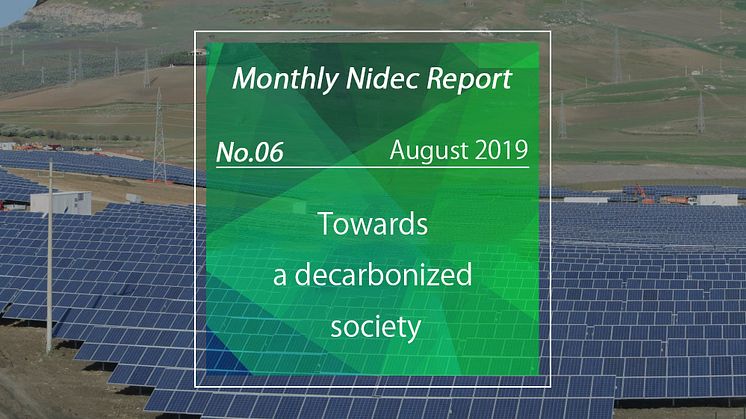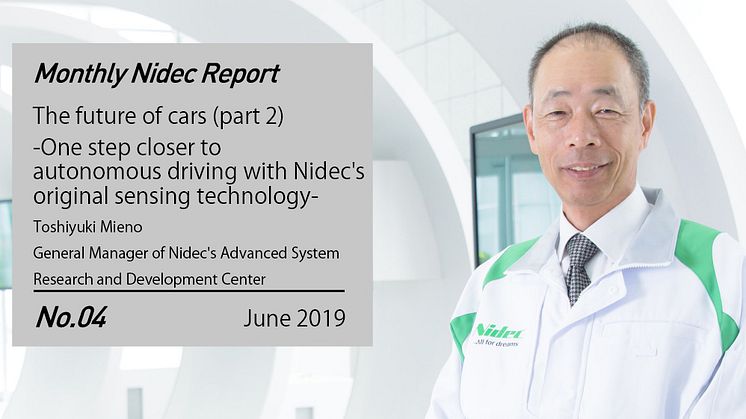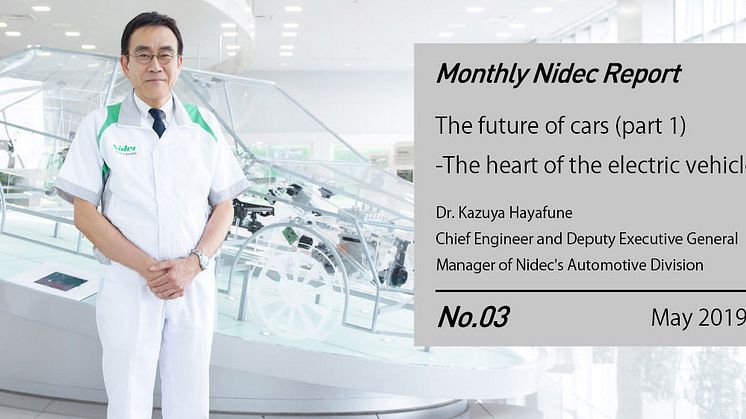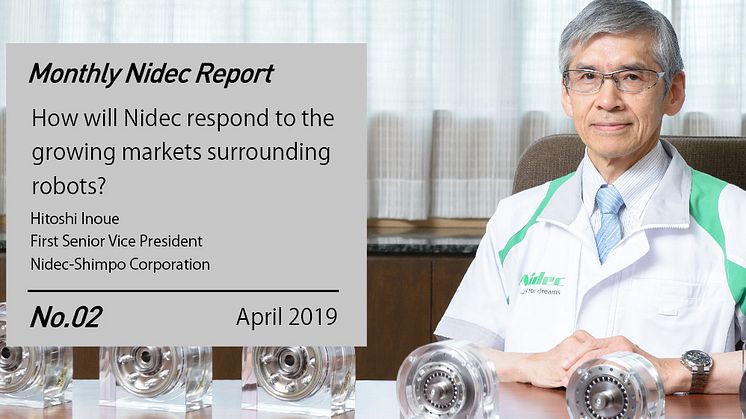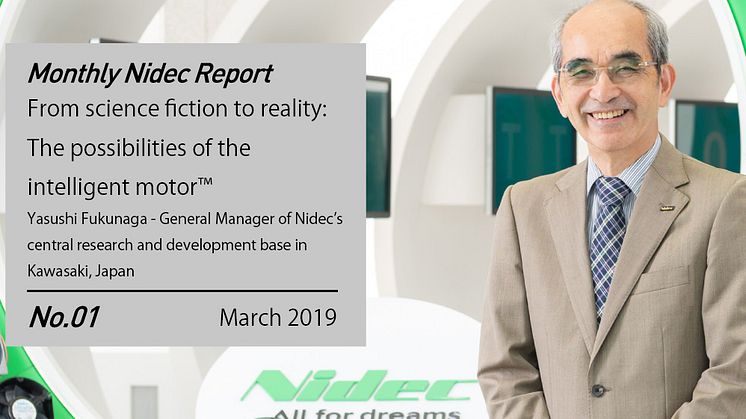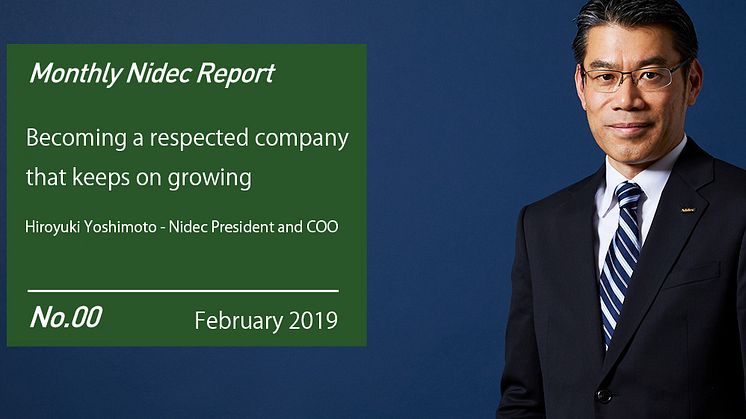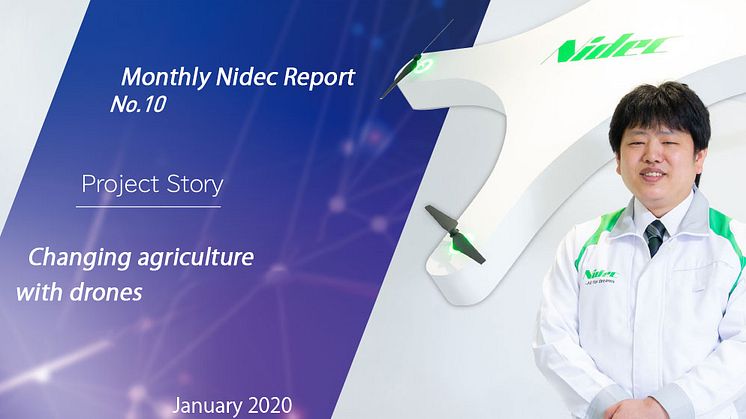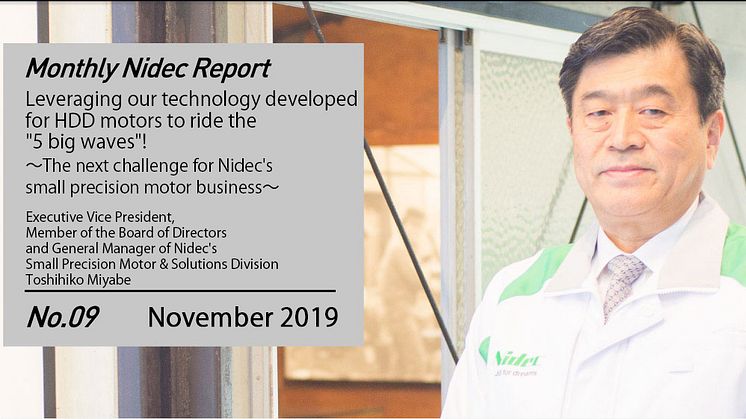
Blog post -
Monthly Nidec Report - The next challenge for Nidec's small precision motor business
With an overwhelming global market share of 85%, Nidec's Hard Disk Drive (HDD) motors are one of the core products that can be said to have laid the foundation of the company group. Now, as "five big waves" are approaching and the business environment surrounding Nidec is changing, the company is poised to leverage the proprietary technology and know-how it has built up over the years in this field in order to catch the new waves and grow the company further.
The HDD motors that lead the global market
- What is the story behind the HDD motor business that first became the driving force behind Nidec's growth?
Nidec first entered the HDD motor business in 1979, a couple of years before I joined the company. Personal computers (PCs) were still in their infancy until the mid-80s and no one could predict whether HDDs would become widespread. Now, Nidec stands before five new technological trends, "the five big waves," that bring with them new business opportunities, but back in the days of the expanding PC market we had never experienced anything like that before. All sorts of companies were entering the various markets surrounding HDDs and these markets were undergoing constant technological innovation. Because of this, component specifications were changing frequently and the end-product manufacturers too were trying to figure out what direction to take as they competed with each other.
In my opinion, the greatest reason why we were able to succeed under these rough conditions was our policy of always putting our customers first. Every business transaction starts with the customer so we would adopt a "Yes we can!" approach and always agree to whatever requirements our customers had. Turning any request down was not possible without the express permission of our founder/CEO, so we spent every single day working frantically to keep up with the increasingly complex requests.
Speed, too, was an important factor. While many of the major companies that we were competing against were waiting to see how the market would unfold, we would create samples and mount them inside HDDs as soon as we received a product inquiry. As a result, HDD designs that took the characteristics of our motors into account became the de facto standard. In other words, we created a situation where we had an advantage over our competitors who had a harder time designing products that fit the needs of the customers.
Another major factor was our mass-production capacity. At the time, we were building new HDD motor factories in various locations at a rapid pace, based on the sole decision of our CEO. When we started building most of these factories many of us employees were worried about the future of the company as we had not yet received enough orders to motivate such large-scale investments (Miyabe says while laughing), but by the time the factories were up and running we were seeing an avalanche of orders.It was nothing short of plain foresight; being quick to secure the capacity to mass-produce on a large scale, before our competitors, by the time that the market, and demand for motors, was expanding really strengthened our competitiveness.

- Nidec's HDD motor business kept on growing after the initial expansion of the PC market as well. What major innovations happened during that period?
The most important innovation was the switch from ball bearings to fluid dynamic bearings (FDB). Fluid dynamic bearings use fluids like oil instead of metal balls between the bearing and the shaft. It is a revolutionary technology that reduces vibration and noise. The principle behind the technology has been known for over 100 years, but no companies had been able to successfully commercialize it for mass-production at the time, so a fierce competition to be the first company to do so unfolded. Nidec bet the future of the company on this technology and made large scale R&D investments. FDB technology requires parts processing on a sub-micron level (one 10,000th of a millimeter), a level of precision that no subcontractors offer. Thus, we launched a joint project with Nidec Tosok, a Nidec group company with a lot of experience in precision machining and precision measurement, aimed at developing the necessary technology in-house. This eventually led to Nidec becoming the first company to successfully mass-produce an HDD motor that uses FDB technology, allowing us to capture an overwhelmingly large share of the market and continue growing our HDD motor business even more.
Higher profit margins with more added value
- What are the market conditions surrounding HDDs today?
After reaching their peak, 650 million units, in 2010 HDD shipments have been slowly decreasing. In 2018, 380 million units were shipped. One of the driving factors behind this decline is the impact that the emergence of smart phones and tablets has had on the PC market. Another factor is the increased use of semiconductor-based Solid-State Drives (SSD) instead of HDDs. SSDs require no moving parts like motors, have higher processing speeds and consume less power. Their main drawback is that they cost more than HDDs, but the price of semiconductors has fallen significantly recently, which, combined with the differences in performance, has accelerated the switch from HDDs to SSDs in laptops and other devices.
However, this is not to say that the demand for HDDs is falling in all areas. In fact, there are some applications that have experienced an increase in demand for HDDs. The biggest of these is data centers that, due to the vast amount of data accumulated in the cloud, still prefer high-capacity HDDs. Data that used to be managed locally is now stored in the cloud. You could say that the HDDs that used to be inside PCs have migrated to data centers instead. It has been predicted that when the age of big data arrives and 5G network technology rolls out full-scale the amount of data stored in the cloud will veritably explode and the demand for HDDs will grow as well. 4K and 8K resolution TV broadcasting, recording and storage of data HD security cameras among other things are also expected to drive up the demand for HDDs.

- Moving forward, what are the prospects for Nidec's HDD motor business?
In terms of sales, the shrinking size of the market will inevitably have an impact, but I believe that the unit price of data center HDDs, which is higher on average than that of PC HDDs, will compensate for the lower unit count.When it comes to profit, we are actively cutting costs by consolidating factories, increasing insourcing and improving productivity. At the same time, we are also focusing on developing products with higher added value. One example of this is helium-filled HDDs. By filling HDDs with helium, instead of air, you can reduce the drag friction, leading to improved reading accuracy, higher storage capacity and lower energy consumption. Since helium atoms are significantly smaller than particles and molecules in air, enclosing the helium so that it does not leak from the aluminum die casting base plates is a difficult task, but our advanced proprietary die-and-mold casting technology has allowed us to succeed with this.
In this way, we intend to leverage our technologies related not only to motors but also to other parts like the HDD base plates and top covers to further expand our business while also focusing on high-added-value products.
Nidec's solutions for information and communications technology
The growth opportunities offered by 5G technology

- Moving forward, what is your growth strategy for Nidec's small precision motor business?
For some time, we have been talking a lot about four major trends—four large waves, so to speak—that have a large impact on the business environment surrounding Nidec: the electrification of automobiles, the sudden expansion of the robot market, the increased focus on energy efficiency in appliances, and a revolution in logistics. Recently, a fifth trend has started to emerge as well: the explosion of digital data brought about by 5G technology. Our small precision motor business feels the impact of all of these five trends and new business opportunities are emerging in each of these areas.
For example, with the digital data explosion that comes with the arrival of 5G technology the demand for thermal solutions will increase.
- What are thermal solutions?
Thermal solutions are solutions to heat-related problems—for example, how to dissipate the heat generated by a piece of electric equipment. When the age of 5G arrives, the amount of data used in various fields will increase dramatically. As a result, managing the heat generated by all the processors and electronic circuits that process all this data will become an important issue. One of the products that is expected to contribute to solving this problem is our UFF technology. UFF stands for UltraFlo FDB—a combination of Nidec's UltraFlo cooling fans developed for computers and our Fluid Dynamic Bearing technology that has proven itself in the field of HDDs. In addition to minimizing noise and vibrations, FDB has the added benefit of being particularly suited for thin designs. While cooling fans that use ball bearings are limited to 10 mm or so in terms of thinness, FDB cooling fans can be made thinner than 3 mm. Taking advantage of this benefit, we have mainly been marketing our UFF cooling fans for use in thin notebook computers so far, but we believe that the demand for these fans will increase in other areas as well in the future. One of the reasons for this is that fluid dynamic bearings handle heat better than their ball bearing counterparts. If you look at automotive parts, for example, the electronic control units that control electrical systems become increasingly complex with the electrification and automation of automobiles, and there are estimates that they may become as hot as 100 to 120°C (200 to 250°F). At these temperatures, using UFF cooling fans is the only viable option.

- In November 2018, the Nidec group acquired the Taiwanese company Chaun-Choung Technology (CCI). Was this acquisition also related to your thermal solution business?
That's correct. CCI mainly manufactures heat pipes—a device that transfers heat away from PC CPUs and other heat-sensitive equipment. When combined with cooling fans, heat pipes make excellent cooling devices, but since CCI does not make their own cooling fans they have been designing their heat pipes in accordance with drawings and diagrams sent by PC manufacturers up until now. However, after joining hands with Nidec, they become more competitive as they are now able to offer modules that integrate cooling fans and heat pipes. In addition to this, CCI also has other technologies like vapor chambers (high thermal conductivity hollow-structure devices that dissipate heat by repeatedly vaporizing and condensing a hydraulic fluid) and water cooling modules (devices that utilize circulating water with higher heat capacity than air to transport excess heat from CPUs to external radiators) for data centers. By combining these with Nidec's technologies and sales channels, we expect that CCI will be able to develop new business opportunities.
- Are there any other new business opportunities related to 5G and the explosion of digital data?
The pop-up / slide-up camera for smart phones that we started mass-producing in January, 2019 is another promising product. As the age of 5G approaches, there has been a push for bezel-less smart phones that maximize screen size. However, with smartphones that utilize the entire front side of the phone for the screen there is no longer any room left for the front-facing camera that is necessary for facial recognition and other things like taking selfies. For this reason, some smart phones have adopted a design with a front-facing camera that pops or slides up from the top of the phone.
This mechanism mainly consists of a stepping motor—a stepping motor is a motor that moves in discrete steps. Stepping motors are used in industrial robots, airplanes, automobiles, office equipment and various other applications—and high-precision gears. The Nidec group has a long history of designing and manufacturing these components and our technology is world class, so smart phone manufacturers from all over the world are approaching us about these camera mechanisms.

Smart phone related components is a particularly important market for us and we plan to actively expand our business in this area by leveraging our thermal solutions, camera movement mechanisms and tactile devices (see below).

- What growth strategies do you have for the other four trends?
Starting with the electrification of automobiles, as I mentioned earlier, we are developing thermal solutions for electronic control units. Also, since electric vehicles are quieter than their gasoline-driven counterparts, we expect to see a rise in demand for quiet FDB cooling fans.
We are also quite active when it comes to energy-saving appliances. One of our main products in this market is refrigerator cooling fans. Many homes around the world still use direct-cooling refrigerators in which the freezers are cooled directly with refrigerant pipes. A disadvantage of this design is that you get frost buildup in the freezer. More and more refrigerators these days use cooling fans to send cool air into the freezer instead of cooling it directly. Motors for vacuum cleaners is another specialty of Nidec. Our efficient brushless DC motors outperform AC motors that cannot be used for extended amounts of time in cordless applications like robotic vacuum cleaners and stick vacuum cleaners. Furthermore, our suction blower fans for robotic vacuum cleaners have captured approximately 70% of the global market share. These products that leverage technology that we initially designed for optical disc drive motors that rotate CDs and DVDs etc., are especially popular among our customers for their low price and high precision.
As for the logistics field, we focus on wheel drive units and modules that are used in a variety of situations.
For the robot market, we are researching and developing gears and actuators for small robots in addition to tactile devices (see below). The greatest strength that we have gained through our experience in the HDD motor business—our sub-micron precision machining capabilities—opens up the door to manufacturing micro motors for small robots. Although the demand for these motors is comparatively low right now, we are preparing for the inevitable rise in demand that we are confident that we will see from here on.
Taking an overall look at our small precision motors and solutions business, we can see that the technology and know-how that we have accumulated in the HDD motor business is instrumental in supporting the future of the business. The growth of the small precision motors and solutions business is firmly rooted in the attitude of Nidec's founder—continuously taking on new challenges with a "Yes we can!" approach.
 Tactile devices is an area in which small precision motors are expected to contribute a lot. These devices use technology that relies on the vibration of motors to convey a variety of different sensations. A typical example of this is the vibration used by our phones, but there are many more ways in which this technology can be used: touchscreens that vibrate in a way that makes it feel like you are pressing physical buttons, human-robot handshakes, the sensation of touching physical objects in virtual reality applications to name a few. Nidec's small precision motor and solutions business has made it a goal to contribute to the spread of these tactile devices by leveraging the technologies that we have developed for HDD motors. |


